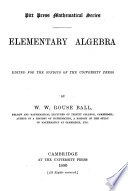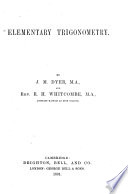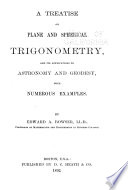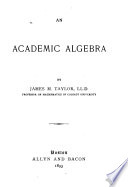 | James Morford Taylor - Algebra - 1889 - 400 pages
...a*'. Hence log., (Af) = px=p log„ M. 306. By § 305, the logarithm of any power of a number equals the logarithm of the number multiplied by the exponent of the power ; and the logarithm of any root of a number equals the logarithm of the number divided by the index... | |
 | William Findlay Shunk - Railroad engineering - 1890 - 360 pages
...quotient is equal to the logarithm of the dividend diminished by that of the divisor. The logarithm of any power of a number is equal to the logarithm of the number multiplied by the exponent of the power. The logarithm of any root of a number is equal to the logarithm of the number divided by the index... | |
 | Walter William Rouse Ball - Mathematics - 1890 - 512 pages
...divisor, and let n = a", .'. y = logan. m _ a* __ ry n a" = loga m — log(l n. 257. Logarithm of a Power. The logarithm of a power of a number is equal to the product of the index of the power and the logarithm of the number. Let m be the number, and let y be... | |
 | George Albert Wentworth - Algebra - 1891 - 536 pages
...this it follows that log — = log 1 — log m. But, since log 1 = 0, log — =• — log m. m III. The logarithm of a power of a number is equal to the logarithm of the number multiplied Ъу the exponent of the power. For, let x be the logarithm of m. Then m = ax, and mP = (a")f = of*.... | |
 | Henry Hunt Ludlow - Logarithms - 1891 - 322 pages
...to the logarithm of the dividend minus that of the divisor. 3°. The logarithm of any power of any number is equal to the logarithm of the number multiplied by the exponent of the power. 4°. The logarithm of any root of any number is equal to the logarithm of the number divided by the... | |
 | John Maximilian Dyer - Plane trigonometry - 1891 - 306 pages
...— — = log. mn - log. pq = log. m + log. n - log. p - log. q. 107. Theorem 3. The logarithm of any power of a number is equal to the logarithm of the number multiplied by the index of the power. Let m be any number, a the base ; we have to show that log. m" = r log, m. Let... | |
 | William Joseph Hussey - Logarithms - 1891 - 172 pages
...is equal to the logarithm of the dividend. minus the logarithm of the divisor. The logarithm of any power of a number is equal to the logarithm of the number multiplied by the index of the power. The logarithm of any root of a number is equal to the logarithm of the number divided... | |
 | Edward Albert Bowser - Trigonometry - 1892 - 392 pages
...a*, and n = a*. — = x — y = logam — log,и. Thus, log = logl7-log5. (6) The logarithm of any power of a number is equal to the logarithm of the number multiplied by the exponent of the power. For let a; = log„m. .-. m = az. .-. logamp = px= (7) The logarithm of any root of a number is equal... | |
 | James Morford Taylor - Algebra - 1893 - 358 pages
...= a"1. Hence Iog. (Mp) =px=p Iog. M. 339. By § 338, the logarithm of any power of a number equals the logarithm of the number multiplied by the exponent of the power ; and the logarithm of any root of a number equals the logarithm of the number divided by the index... | |
 | George Albert Wentworth - Algebra - 1893 - 348 pages
...exponents (§ 294), therefore, when roots are expressed by fractional indices, The logarithm of a root of a number is equal to the logarithm of the number multiplied Ъу the index of the root. Thus, log 2* = } of log 2 = \ X 0.3010 = 0.0753. log .002» = i of (7.3010... | |
| |